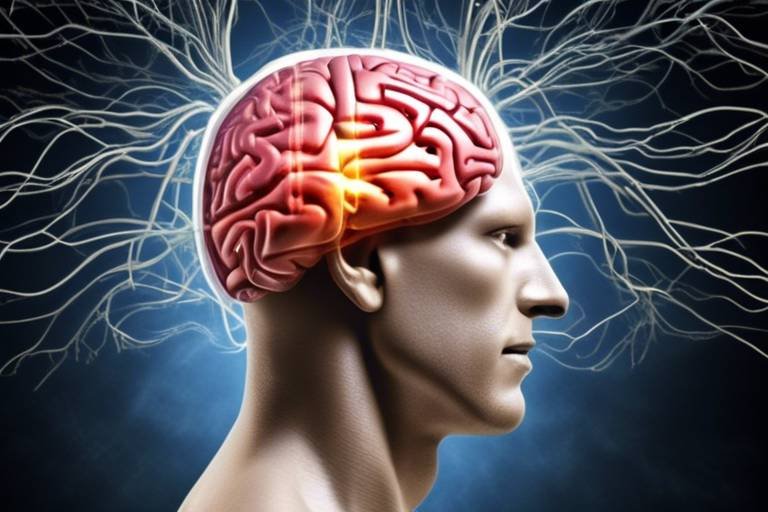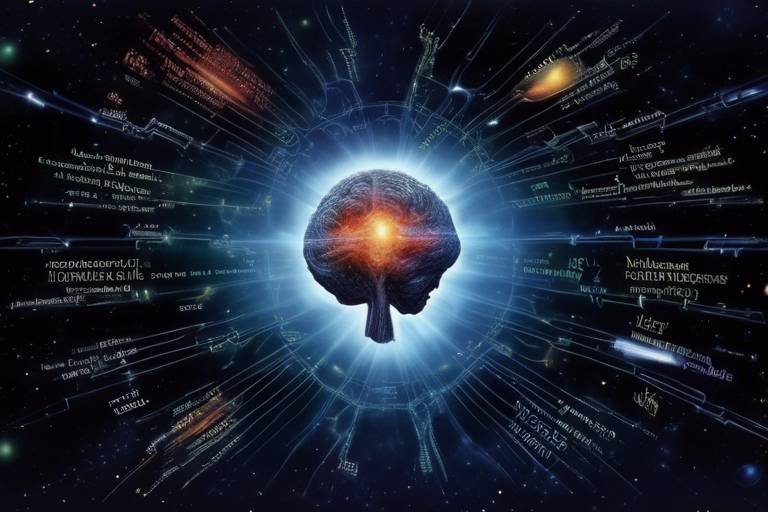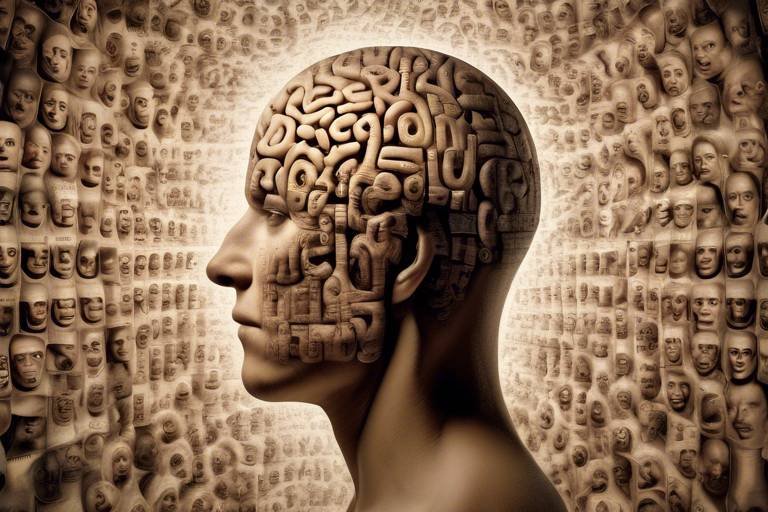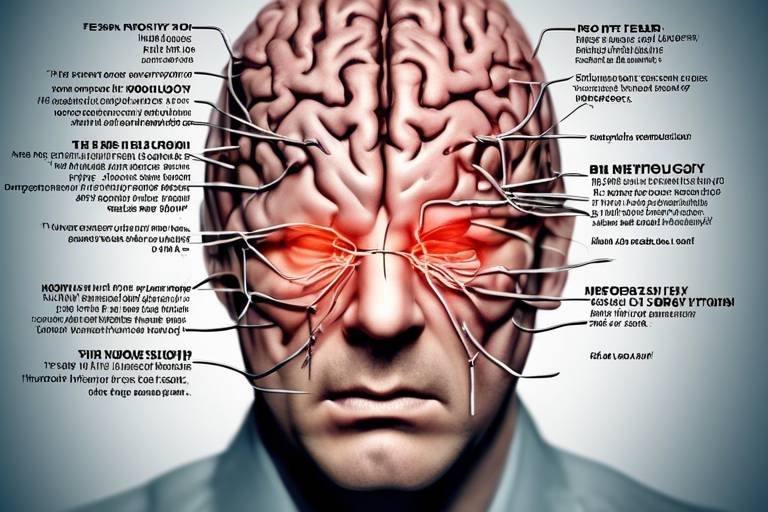The Influence of Physical Brain on Metaphysical Mind
The relationship between the physical structure of the brain and the metaphysical aspects of the mind is a fascinating topic that has captured the attention of scientists, philosophers, and curious minds alike. At first glance, it may seem that the brain, as a physical organ, operates independently of the abstract concepts of consciousness, perception, and cognition. However, a deeper exploration reveals that these elements are intricately intertwined, forming a complex web of interactions that shape our reality.
Imagine the brain as a high-tech control center, where every thought, emotion, and perception is meticulously processed and managed. This control center doesn’t just react to external stimuli; it also shapes our inner experiences and influences how we interpret the world around us. The brain's physical components, including neurons and synapses, serve as the foundation for our thoughts and feelings, while the metaphysical mind encompasses the rich tapestry of our consciousness.
In this article, we will delve into how the brain's physical structure impacts our metaphysical experiences, exploring the brain-body connection, the role of neurotransmitters, and the dynamics of consciousness. This journey will not only enhance our understanding of ourselves but also illuminate the profound connections that exist between the tangible and the intangible aspects of our existence.
The brain-body connection is a powerful concept that emphasizes how our physical state can significantly impact our mental processes. Think of it as a two-way street: our thoughts and emotions can affect our physical health, and conversely, our physical health can influence our mental well-being. For instance, when we experience stress, our body releases stress hormones, which can lead to feelings of anxiety and unease. On the flip side, engaging in regular physical activity can boost our mood and enhance our cognitive function, showcasing the interplay between physiological health and psychological well-being.
This connection is particularly evident in the realm of mindfulness and meditation practices. When individuals engage in these practices, they often report feeling more centered and aware, leading to a greater understanding of their thoughts and feelings. This heightened awareness can lead to profound shifts in perception, illustrating how the brain's physical state can facilitate metaphysical experiences.
At the heart of the brain's functionality are neurotransmitters, which act as chemical messengers that facilitate communication between neurons. These substances are crucial for regulating mood, perception, and cognitive functions, thereby serving as a bridge between physical brain activity and metaphysical experiences. Without neurotransmitters, our ability to experience emotions and engage in complex thought processes would be severely impaired, highlighting their importance in our daily lives.
Different neurotransmitters play unique roles in shaping our mental states. For example:
- Dopamine: Often referred to as the "feel-good" neurotransmitter, dopamine is essential for motivation and reward. It influences how we perceive challenges and opportunities, linking our physical brain activity to our metaphysical aspirations.
- Serotonin: This neurotransmitter is key to emotional regulation, impacting our experiences of joy and sadness. A balanced level of serotonin contributes to overall well-being, connecting our physical brain health with the metaphysical realm of emotions.
Dopamine's role in motivation cannot be overstated. It drives us to pursue goals and rewards, affecting how we perceive challenges. When dopamine levels are balanced, we feel energized and ready to tackle our ambitions. However, an imbalance can lead to feelings of apathy and disinterest, illustrating how our physical brain's chemical makeup can directly influence our metaphysical desires and aspirations.
Serotonin is another critical player in our mental health. It helps regulate mood, sleep, and appetite. When serotonin levels are optimal, we experience emotional balance, allowing us to navigate life's ups and downs with greater ease. Conversely, low serotonin levels can lead to conditions like depression and anxiety, showcasing the profound connection between our physical brain health and our emotional experiences.
One of the most exciting aspects of brain science is the concept of neuroplasticity. This refers to the brain's remarkable ability to reorganize itself in response to new experiences, learning, and environmental changes. Neuroplasticity demonstrates that our mindset and perception can be shaped by physical changes in the brain. For instance, engaging in new activities or learning new skills can create new neural pathways, fundamentally altering how we think and feel.
Imagine your brain as a vast landscape with countless pathways. Every time you learn something new or experience a shift in perspective, a new path is carved. This dynamic relationship between physical changes in the brain and metaphysical outcomes underscores the potential for personal growth and transformation.
The study of consciousness is a captivating field that examines how brain function correlates with subjective experiences. It raises profound questions about the nature of reality and the mind's metaphysical dimensions. How does the brain create the rich tapestry of thoughts and feelings that we experience? What is the essence of consciousness, and how does it relate to our physical existence?
Different states of consciousness, such as wakefulness and sleep, reveal how brain activity influences our metaphysical understanding of existence. During sleep, for example, our brain processes memories and emotions, often leading to vivid dreams that can feel incredibly real. These experiences challenge our perceptions of reality and highlight the intricate relationship between our physical brain states and our metaphysical understanding.
Altered states of consciousness, often induced by practices like meditation or substances such as psychedelics, can lead to profound spiritual experiences. These states can provide deep insights and a sense of connection to something greater than oneself, illustrating the connection between physical brain states and metaphysical insights. When the brain enters these altered states, it can unlock new dimensions of understanding, pushing the boundaries of what we consider reality.
- What is the brain-body connection? The brain-body connection refers to the interplay between our physical state and mental processes, showing how they influence each other.
- How do neurotransmitters affect our emotions? Neurotransmitters are chemical messengers that regulate mood and cognitive functions, impacting how we feel and think.
- What is neuroplasticity? Neuroplasticity is the brain's ability to reorganize itself in response to learning and experience, which can influence our mindset and perceptions.
- How do altered states of consciousness affect our understanding of reality? Altered states can provide profound insights and experiences that challenge our perceptions of reality and consciousness.

Understanding the Brain-Body Connection
The brain-body connection is a fascinating and complex relationship that plays a pivotal role in our overall well-being. It’s like a finely tuned orchestra, where each section must harmonize to create a beautiful symphony. Just as the string section relies on the brass and woodwinds to produce a cohesive sound, our brain and body work together to influence our mental and physical states. This connection is not merely a concept; it is a profound reality that affects how we perceive the world around us and how we respond to it.
At the core of this connection lies the understanding that our physical health directly impacts our mental health. For example, when we engage in regular physical activity, our body releases a cocktail of neurotransmitters that not only improve our mood but also enhance our cognitive functions. It’s as if our body is sending a message to our brain, saying, “Hey, we’re doing great here! Let’s keep this positivity rolling!” Conversely, when we neglect our physical health, it can lead to feelings of anxiety, depression, and a general sense of malaise. This illustrates how intertwined our mental and physical states truly are.
Moreover, the brain itself is not just a passive receiver of signals; it actively influences the body as well. Consider the way stress manifests physically. When we experience stress, our brain triggers a cascade of physiological responses—our heart races, our muscles tense, and our breathing quickens. It’s a classic fight-or-flight response, and it’s all initiated by our brain. This reaction shows just how powerful the brain is in shaping our physical experiences, often leading to what we might describe as a mind-over-matter scenario.
To further illustrate this connection, let’s take a look at some key elements that highlight the interplay between our brain and body:
| Element | Brain Influence | Body Response |
|---|---|---|
| Stress | Activates the amygdala and releases cortisol | Increased heart rate, muscle tension |
| Exercise | Releases endorphins and serotonin | Improved mood, reduced anxiety |
| Nutrition | Affects neurotransmitter production | Enhanced cognitive function and energy levels |
As we delve deeper into the brain-body connection, it becomes evident that achieving a balance between physical and mental health is crucial. It’s like maintaining a garden; if we water the plants (our body) but neglect the soil (our mind), the garden will struggle to flourish. Similarly, nurturing our mental health through practices like mindfulness and meditation can significantly enhance our physical well-being.
In conclusion, the brain-body connection is an intricate dance that influences every aspect of our lives. By understanding this relationship, we can take proactive steps to enhance our overall health. Whether it’s through regular exercise, a balanced diet, or mindfulness practices, fostering this connection can lead to a more fulfilling and vibrant life. So, the next time you feel a shift in your mood or energy, remember that your brain and body are communicating in ways that are both profound and essential.
- What is the brain-body connection? It refers to the relationship between our brain’s functions and our physical health, influencing our overall well-being.
- How does exercise affect mental health? Exercise releases neurotransmitters that improve mood and cognitive function, enhancing mental health.
- Can stress affect physical health? Yes, stress can lead to various physical symptoms and health issues due to the brain's response to stressors.

The Role of Neurotransmitters
Neurotransmitters are the unsung heroes of our brain's intricate communication network. These chemical messengers play a vital role in how our brain cells, or neurons, communicate with each other. Imagine them as tiny postmen, delivering messages that dictate our mood, perception, and cognitive functions. When you think about it, the influence of these neurotransmitters extends far beyond mere chemical reactions; they are the bridge connecting our physical brain activity to our metaphysical experiences. This connection is crucial in understanding how our mental states can be shaped by the health and activity of our brain.
Different neurotransmitters serve unique functions, and their balance is essential for maintaining our mental well-being. For instance, the presence of dopamine can elevate our mood and enhance our motivation, while serotonin is pivotal in regulating our emotions. This relationship between neurotransmitter levels and mental states can be quite profound. When we look deeper, we can see how fluctuations in these chemicals can lead to significant changes in our perceptions and experiences of reality. For example, a deficiency in serotonin can lead to feelings of sadness or depression, illustrating how a physical imbalance can manifest in metaphysical ways.
Understanding the various neurotransmitters and their roles can help demystify the complexities of our mental states. Here’s a brief overview of some key neurotransmitters:
| Neurotransmitter | Function | Impact on Mental State |
|---|---|---|
| Dopamine | Reward and pleasure | Increases motivation and feelings of pleasure |
| Serotonin | Emotional regulation | Helps maintain mood balance and reduces anxiety |
| Norepinephrine | Fight or flight response | Heightens alertness and arousal |
| GABA (Gamma-Aminobutyric Acid) | Inhibitory neurotransmitter | Reduces anxiety and promotes calmness |
As we delve deeper into the world of neurotransmitters, we can appreciate how they influence not just our physical brain but also our metaphysical mind. The delicate balance of these chemicals can determine how we perceive challenges, engage with our surroundings, and even how we connect with others on a deeper level. It’s fascinating to think that something as simple as a chemical imbalance can lead to profound shifts in our consciousness and emotional experiences.
In summary, neurotransmitters are more than just chemicals; they are the key players in the grand symphony of our mental health and metaphysical experiences. By understanding their roles and impacts, we can better navigate our own emotional landscapes and perhaps even unlock new pathways to personal growth and well-being.

Types of Neurotransmitters
Neurotransmitters are the unsung heroes of our brain, acting as the chemical messengers that facilitate communication between neurons. They play a pivotal role in shaping our mental states, influencing everything from our moods to our perceptions and even our cognitive functions. Imagine neurotransmitters as the mail carriers of your brain, delivering vital information that helps orchestrate the symphony of your thoughts and emotions. Each type of neurotransmitter has its own unique effects, akin to different instruments in an orchestra, contributing to the overall harmony of our mental experiences.
Among the myriad of neurotransmitters, a few stand out due to their significant impact on our daily lives. For instance, dopamine is often dubbed the "feel-good" neurotransmitter. It plays a crucial role in our brain's reward system, helping us feel pleasure and satisfaction in response to enjoyable activities. This neurotransmitter not only motivates us but also influences how we perceive challenges and opportunities. Think of it as the fuel that drives our aspirations and ambitions, pushing us to chase after our dreams.
On the other hand, serotonin is often associated with emotional regulation. It helps stabilize our mood, impacting feelings of happiness and sadness. When serotonin levels are balanced, we tend to feel more content and emotionally stable. However, a deficiency in serotonin can lead to feelings of anxiety and depression, highlighting its critical role in our mental health. Imagine serotonin as the calming breeze on a hot day, soothing our emotional turbulence and bringing about a sense of peace.
Other noteworthy neurotransmitters include norepinephrine, which is involved in our fight-or-flight response, and GABA (gamma-aminobutyric acid), which acts as a natural tranquilizer, helping to reduce anxiety and promote relaxation. Each neurotransmitter contributes to a complex web of interactions that define our mental and emotional landscapes. Understanding these chemical messengers is crucial for grasping how our physical brain influences the metaphysical aspects of our mind.
| Neurotransmitter | Function | Effects on Mind |
|---|---|---|
| Dopamine | Reward and pleasure | Motivation, pleasure, and reinforcement of behaviors |
| Serotonin | Mood regulation | Emotional stability, happiness, and anxiety reduction |
| Norepinephrine | Stress response | Increased alertness and arousal |
| GABA | Inhibition of neural activity | Reduction of anxiety and promotion of relaxation |
In summary, the intricate dance of neurotransmitters within our brain not only influences our physical state but also profoundly impacts our metaphysical experiences. By understanding these chemical messengers, we gain insight into the delicate balance between our brain's physical structure and the vast, often mysterious realm of our mind. This connection sheds light on how our mental states can be influenced by our physiological health, paving the way for a deeper understanding of our consciousness and existence.
- What are neurotransmitters? Neurotransmitters are chemical messengers that transmit signals between neurons, influencing various functions such as mood, perception, and cognition.
- How do neurotransmitters affect mental health? Imbalances in neurotransmitter levels can lead to mental health issues, such as depression and anxiety, affecting emotional regulation and overall well-being.
- Can diet influence neurotransmitter levels? Yes, certain nutrients and foods can affect the production and function of neurotransmitters, impacting mood and cognitive function.
- What role does dopamine play in motivation? Dopamine is crucial for the brain's reward system, motivating individuals to pursue goals and seek pleasurable experiences.

Dopamine's Influence on Motivation
Dopamine, often referred to as the "feel-good" neurotransmitter, plays a pivotal role in our motivation and reward systems. Think of dopamine as the fuel for your brain’s engine; when you achieve something, whether big or small, dopamine is released, giving you that burst of pleasure and satisfaction. This surge not only feels great but also compels you to seek out similar experiences in the future. Have you ever noticed how completing a task or reaching a goal can make you feel energized and eager to tackle the next challenge? That’s dopamine in action!
The relationship between dopamine and motivation can be quite profound. When dopamine levels are optimal, individuals are more likely to feel driven and enthusiastic about their pursuits. However, when these levels drop, one might experience a lack of motivation or even feelings of apathy. This fluctuation can be likened to a roller coaster ride; when you're at the peak, everything feels exhilarating, but at the lowest point, it can feel like a drag. Understanding this dynamic is crucial for anyone looking to harness their potential and achieve their dreams.
To better illustrate this point, consider the following table that outlines how dopamine influences various aspects of motivation and behavior:
| Aspect | Dopamine's Role |
|---|---|
| Goal Setting | Dopamine motivates individuals to set and pursue goals by creating a sense of anticipation and reward. |
| Reward Processing | It reinforces behaviors that lead to positive outcomes, encouraging repetition of those behaviors. |
| Learning | Dopamine enhances learning by associating certain actions with pleasurable outcomes. |
| Overcoming Challenges | A boost in dopamine can increase resilience, helping individuals tackle challenges with a positive mindset. |
In essence, dopamine acts as a motivational compass, guiding us towards our aspirations and helping us navigate the complexities of life. When we engage in activities that boost dopamine levels—like exercising, achieving small goals, or even enjoying a favorite hobby—we are effectively priming our brains for success. It's almost like training a dog with treats; the more you reward positive behavior, the more likely it is to be repeated.
So, the next time you find yourself feeling unmotivated, consider ways to naturally boost your dopamine levels. Whether it’s through physical activity, social interactions, or simply indulging in something you love, remember that you hold the key to unlocking your motivation. By understanding and leveraging the influence of dopamine, you can create a more fulfilling and driven life, transforming your physical brain activity into metaphysical aspirations.
- What is dopamine? Dopamine is a neurotransmitter that plays a key role in the brain's reward system, influencing motivation and pleasure.
- How does dopamine affect motivation? Dopamine motivates individuals by creating feelings of pleasure and satisfaction when achieving goals, encouraging the pursuit of similar experiences.
- Can low dopamine levels lead to lack of motivation? Yes, low dopamine levels can result in feelings of apathy and decreased motivation.
- What are some natural ways to boost dopamine? Engaging in physical exercise, setting and achieving small goals, and enjoying hobbies can help increase dopamine levels naturally.

Serotonin and Emotional Regulation
Serotonin, often dubbed the "feel-good" neurotransmitter, plays a crucial role in emotional regulation. It’s fascinating how this single chemical can have such a profound impact on our daily lives, influencing everything from our mood to our overall sense of well-being. Imagine serotonin as a conductor of an orchestra, harmonizing various aspects of our emotions and ensuring that our mental symphony plays smoothly. When serotonin levels are balanced, individuals tend to experience a sense of calm and happiness; however, when these levels drop, it can lead to feelings of sadness, anxiety, or irritability.
Research has shown that serotonin affects various brain functions, including mood, anxiety, and even aggression. The relationship between serotonin and emotional health is so significant that many antidepressant medications, like SSRIs (Selective Serotonin Reuptake Inhibitors), aim to increase serotonin levels in the brain. This highlights how vital serotonin is in maintaining emotional stability and preventing mood disorders. In a world where stress and anxiety are prevalent, understanding serotonin's role can be a game-changer for many.
Moreover, serotonin doesn’t just operate in isolation; it interacts with other neurotransmitters and hormones, creating a complex network that influences our emotional landscape. For instance, when serotonin levels are high, they can help mitigate feelings of fear and anxiety, essentially acting as a natural buffer against stress. Conversely, low serotonin levels can lead to a cascade of negative emotions, making it harder to cope with daily challenges.
To further illustrate serotonin's impact, consider the following table that summarizes its effects on emotional states:
| Serotonin Level | Emotional State |
|---|---|
| High | Calm, Happy, Balanced |
| Normal | Stable, Content |
| Low | Anxious, Depressed, Irritable |
In essence, serotonin serves as a bridge between our physical brain health and the metaphysical realm of emotions. When we maintain healthy serotonin levels through diet, exercise, and lifestyle choices, we are not only enhancing our physical health but also nurturing our emotional well-being. It's a beautiful reminder of how interconnected our bodies and minds truly are, and how small changes can lead to significant improvements in our overall quality of life.
- What is serotonin? Serotonin is a neurotransmitter that helps regulate mood, anxiety, and overall emotional well-being.
- How does serotonin affect my mood? Higher levels of serotonin are associated with feelings of happiness and calm, while lower levels can lead to anxiety and depression.
- What can I do to boost my serotonin levels? Regular exercise, a healthy diet rich in tryptophan, and exposure to sunlight can help increase serotonin levels naturally.
- Are there medications that affect serotonin? Yes, many antidepressants work by increasing serotonin levels in the brain to help alleviate symptoms of depression and anxiety.

Neuroplasticity and Mindset
Neuroplasticity, often referred to as the brain's ability to reorganize itself by forming new neural connections, is a fascinating concept that has profound implications for our mindset and how we perceive the world. Imagine your brain as a vast network of highways; every experience you have is like a car traveling down these roads. Some routes are well-traveled, while others are less explored. Neuroplasticity allows us to build new roads, changing our mental landscape over time. This means that with the right practices, we can literally reshape our thoughts and behaviors.
One of the most exciting aspects of neuroplasticity is its role in personal growth and development. When we engage in new activities, learn new skills, or even change our thought patterns, we are actively participating in this process. For instance, when someone decides to adopt a more positive outlook on life, they are not just wishing for a change; they are rewiring their brain. This transformation can lead to a more resilient mindset, enabling them to tackle challenges with greater confidence.
Research shows that neuroplasticity is particularly pronounced during certain periods of life, such as childhood. However, it doesn't stop there. Adults can also harness this ability through practices like mindfulness, meditation, and cognitive behavioral therapy. These techniques encourage the brain to create new pathways, reinforcing positive thoughts and diminishing negative ones. The connection between physical brain changes and metaphysical outcomes is evident here, as a shift in mindset can lead to improved emotional health and overall well-being.
To illustrate the impact of neuroplasticity on mindset, consider the following table that outlines some key practices that promote brain change:
| Practice | Impact on Neuroplasticity |
|---|---|
| Mindfulness Meditation | Enhances focus and emotional regulation |
| Learning New Skills | Encourages the formation of new neural pathways |
| Physical Exercise | Improves cognitive function and mood |
| Cognitive Behavioral Therapy | Helps reframe negative thought patterns |
Engaging in these practices not only sharpens our cognitive abilities but also enriches our metaphysical experiences. It’s like tuning a musical instrument; the more we practice, the more harmonious our thoughts and emotions become. As we create new neural connections, we cultivate a more adaptable mindset that can respond to life’s challenges with creativity and resilience.
In conclusion, neuroplasticity is not just a scientific term; it’s a powerful tool that allows us to redefine our mental frameworks. By understanding and leveraging this ability, we can foster a mindset that is not only more positive but also more aligned with our deeper aspirations. The interplay between our physical brain and metaphysical mind is a dance of possibilities, and neuroplasticity is the music that guides our steps.
- What is neuroplasticity? - Neuroplasticity is the brain's ability to reorganize itself by forming new neural connections throughout life, allowing for learning and adaptation.
- How can I promote neuroplasticity? - Engaging in activities like mindfulness meditation, learning new skills, and exercising can enhance neuroplasticity.
- Is neuroplasticity important for mental health? - Yes, neuroplasticity plays a crucial role in mental health by enabling individuals to reframe negative thought patterns and improve emotional regulation.
- Can anyone experience neuroplasticity? - Absolutely! Neuroplasticity occurs in everyone, regardless of age, and can be harnessed through intentional practices.

Consciousness and Brain Function
When we delve into the fascinating realm of consciousness, we find ourselves standing at the crossroads of science and philosophy. What exactly is consciousness? Is it merely a byproduct of our brain's intricate wiring, or does it possess a metaphysical essence that transcends our physical existence? These questions spark curiosity and debate, highlighting the profound relationship between our brain function and our subjective experiences. The brain, with its complex network of neurons, plays a crucial role in shaping our awareness, thoughts, and perceptions. Every thought we have, every emotion we feel, and every decision we make is intricately linked to the physical processes occurring within our brain.
One of the most compelling aspects of this relationship is how different states of consciousness can be influenced by brain activity. For instance, during wakefulness, our brain operates in a highly active state, characterized by rapid neuronal firing and increased blood flow. This state allows us to engage with the world around us, process information, and respond to stimuli. In contrast, during sleep, particularly in the REM (Rapid Eye Movement) phase, our brain exhibits unique patterns of activity that are essential for memory consolidation and emotional regulation. It's during these altered states of consciousness that we often experience vivid dreams, which can feel incredibly real and sometimes even metaphysical in nature.
Furthermore, the exploration of altered states of consciousness, such as those induced by meditation, hypnosis, or psychedelics, opens up a whole new dimension of understanding. These experiences can lead to profound spiritual insights, a sense of interconnectedness, and a deeper awareness of reality. The brain's ability to shift its function in these states demonstrates its remarkable plasticity and adaptability. For example, research has shown that meditation can physically change the structure of the brain, enhancing regions associated with emotional regulation and self-awareness.
To illustrate the connection between consciousness and brain function, consider the following table that summarizes how different brain states correlate with various aspects of consciousness:
| Brain State | Characteristics | Consciousness Aspect |
|---|---|---|
| Wakefulness | Active brain, high alertness | Engagement with the external world |
| REM Sleep | Vivid dreams, brain activity similar to wakefulness | Memory consolidation, emotional processing |
| Meditation | Calm, focused brain activity | Heightened self-awareness, spiritual insights |
| Psychedelic State | Altered perception, profound experiences | Expanded consciousness, sense of unity |
As we continue to unravel the mysteries of consciousness, it's essential to recognize that our understanding is still evolving. The interplay between brain function and consciousness invites us to explore not only the biological underpinnings of our mental experiences but also the metaphysical implications of our existence. After all, if consciousness is merely a product of brain activity, what does that say about our sense of self, our emotions, and our connection to the universe? The answers to these questions may ultimately redefine our understanding of what it means to be human.
- What is consciousness? Consciousness refers to the state of being aware of and able to think about one's own existence, thoughts, and surroundings.
- How does brain function affect consciousness? Brain function directly influences consciousness by determining how we perceive reality, process information, and experience emotions.
- Can altered states of consciousness provide spiritual insights? Yes, altered states, such as those induced by meditation or psychedelics, can lead to profound spiritual experiences and a deeper understanding of existence.
- What role does neuroplasticity play in consciousness? Neuroplasticity allows the brain to reorganize itself, which can change how we think and perceive the world, affecting our consciousness.

States of Consciousness
The concept of is a fascinating area of study that delves into the various levels of awareness that humans can experience. From the clarity of being fully awake to the depths of sleep, our consciousness can shift dramatically, influencing how we perceive the world around us. Have you ever noticed how your thoughts can change when you're tired? Or how a moment of meditation can transport you to a place of profound tranquility? These experiences highlight the intricate relationship between our brain activity and our subjective experiences.
At its core, consciousness can be divided into several distinct states, each characterized by unique brain wave patterns and cognitive functions. For instance, when we are awake and alert, our brain exhibits beta waves, which are associated with active thinking and problem-solving. In contrast, during deep sleep, our brain transitions to delta waves, which are crucial for restorative processes. This fluctuation in brain activity not only affects our physical health but also our mental clarity and emotional well-being.
Moreover, there are altered states of consciousness that can be induced through various practices or substances. These states can lead to experiences that feel transcendent or spiritual. For example, meditation often brings about a state known as theta wave activity, where individuals may feel a greater sense of connection to themselves and the universe. Similarly, the use of psychedelics can push the boundaries of our typical awareness, sometimes resulting in profound insights or a sense of unity with all that exists. Such experiences challenge our understanding of reality and consciousness itself, prompting questions about the very nature of existence.
To better illustrate the different states of consciousness, consider the following table:
| State of Consciousness | Brain Wave Activity | Characteristics |
|---|---|---|
| Awake | Beta Waves | Alert, focused, engaged in problem-solving |
| Relaxed | Alpha Waves | Calm, peaceful, creative thinking |
| Deep Sleep | Delta Waves | Restorative, healing, unconscious |
| REM Sleep | Theta Waves | Vivid dreams, emotional processing |
| Altered State | Varied | Transcendental experiences, heightened awareness |
Understanding these states of consciousness not only sheds light on our cognitive processes but also enhances our awareness of how our physical brain impacts our metaphysical experiences. It raises intriguing questions: What if our perception of reality is merely a reflection of our brain's current state? How do these shifts in consciousness shape our beliefs, emotions, and ultimately, our lives? The answers to these questions could unlock a deeper understanding of the human experience, bridging the gap between the physical and the metaphysical.
- What are the main states of consciousness? The main states include awake, relaxed, deep sleep, REM sleep, and altered states.
- How do altered states of consciousness affect perception? They can lead to profound insights and a sense of unity with the universe.
- What brain waves are associated with different states? Beta waves are for alertness, alpha waves for relaxation, delta waves for deep sleep, and theta waves for REM sleep.
- Can meditation change your state of consciousness? Yes, meditation can induce a relaxed state that enhances awareness and emotional balance.

Altered States and Spiritual Experiences
Altered states of consciousness have fascinated humanity for centuries, often serving as gateways to profound spiritual experiences. These states can be induced through various means, such as meditation, breath control, sensory deprivation, or even the use of psychedelics. When individuals enter these altered states, they often report transformative experiences that challenge their understanding of reality and self. Imagine stepping into a world where the boundaries of your mind expand, and you can perceive existence in a completely different light. It's like flipping a switch that illuminates the hidden corners of your consciousness.
During these experiences, individuals frequently describe feelings of unity with the universe, heightened awareness, and profound insights into their existence. This phenomenon raises intriguing questions about the relationship between the physical brain and the metaphysical mind. For instance, what happens in the brain during these altered states? Are there specific neural pathways that become activated, allowing for these extraordinary experiences? Research suggests that certain areas of the brain, such as the default mode network (DMN), play a critical role in self-referential thought and ego dissolution, which are often reported during spiritual experiences.
One compelling aspect of altered states is their ability to foster a sense of connection to something greater than oneself. Many individuals report experiencing a deep sense of peace, love, and interconnectedness with all living things. This can be likened to the feeling of being part of a vast ocean, where individual waves merge into a collective whole. Such experiences can lead to lasting changes in perspective, encouraging individuals to embrace a more holistic view of life and their place within it.
Moreover, the role of neurotransmitters cannot be overlooked in this context. During altered states, the brain releases a cocktail of chemicals, including serotonin, dopamine, and endorphins, which can significantly enhance mood and perception. For example, psychedelics like psilocybin and LSD have been shown to increase serotonin levels, leading to altered perception and emotional release. This biochemical shift can create a fertile ground for spiritual insights and experiences, further blurring the lines between the physical and metaphysical realms.
In conclusion, altered states of consciousness serve as a fascinating intersection between the physical brain and the metaphysical mind. They invite us to explore not only the mechanics of our brain but also the deeper questions of existence, purpose, and connection. As we delve into these experiences, we may find that the boundaries of our understanding are not as rigid as they seem, opening doors to a more profound appreciation of life and consciousness.
- What are altered states of consciousness? Altered states of consciousness refer to mental states that differ significantly from normal waking consciousness, often induced by various techniques or substances.
- How do altered states relate to spirituality? Many individuals report experiencing spiritual insights and a sense of connection to a greater reality during altered states, suggesting a link between brain activity and metaphysical experiences.
- Can altered states be achieved without substances? Yes, altered states can be achieved through meditation, breathwork, and other practices that focus on altering awareness and perception.
- What role do neurotransmitters play in altered states? Neurotransmitters like serotonin and dopamine are released during altered states, influencing mood and perception, which can enhance spiritual experiences.
Frequently Asked Questions
- What is the brain-body connection?
The brain-body connection refers to the intricate relationship between our physical brain and how it influences our mental processes. This connection highlights the impact of physiological health on psychological well-being, suggesting that what happens in our bodies can significantly affect our thoughts, emotions, and overall mental state.
- How do neurotransmitters affect our mood?
Neurotransmitters are like the messengers of the brain, carrying signals between neurons. They play a crucial role in regulating our mood and perception. For instance, dopamine is linked to feelings of pleasure and motivation, while serotonin helps maintain emotional balance. Changes in these chemical messengers can lead to shifts in how we feel and think, bridging the gap between physical brain activity and our metaphysical experiences.
- What is neuroplasticity?
Neuroplasticity is the brain's ability to adapt and reorganize itself throughout our lives. This remarkable feature means that our experiences can physically change the structure of our brain. By fostering positive habits and mindsets, we can influence our perceptions and emotional responses, demonstrating the dynamic relationship between physical brain changes and metaphysical outcomes.
- How does consciousness relate to brain function?
Consciousness is deeply tied to brain function, as our subjective experiences are shaped by the activity within our brains. Different states of consciousness, such as being awake or dreaming, reveal how brain activity influences our understanding of reality. This relationship raises fascinating questions about the nature of existence and the metaphysical dimensions of our minds.
- Can altered states of consciousness lead to spiritual experiences?
Absolutely! Altered states of consciousness, often achieved through practices like meditation or the use of psychedelics, can open doors to profound spiritual experiences. These states can shift our perception and enhance our understanding of the metaphysical aspects of existence, illustrating how physical changes in the brain can lead to significant insights into our spiritual lives.



















